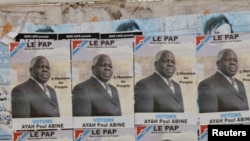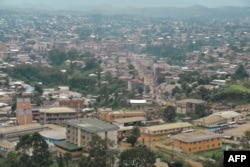Cameroon's President Paul Biya has ordered the release of three anglophone leaders detained over the ongoing strike in parts of the country. The move is in an important concession to strikers' demands and may open the way to renewed talks to the end the nine-month crisis.
Neighbors, relatives, admirers and family members prayed at the Yaounde Tam Tam Weekend residence of Ayah Paul Abine. The former advocate general of the supreme court of Cameroon and national chairman of the Popular Action Party was arrested in January 2017 and locked up at the defense headquarters in Yaounde.
After gaining his freedom Thursday, Abine found it difficult to speak.
He said the only thing he can say besides what the family spokesperson will tell VOA is that he is grateful to God.
Abine looked tired and sick and has grown white hair all over his head and chin. His wife Valentine Endale Ayah said her husband had an infection while in detention.
She said her husband who was in very good health before his arrest is now a cardiac patient and has to take at least eight different medicines every morning to survive. She said since the crisis that almost took his life while under detention, Paul no longer sees well.
Abine, lawyer Felix Agbor Balla, Doctor Neba Fontem and 53 others who faced charges at the Yaounde Military Tribunal were released following an order signed by Ferdinand Ngo Ngo, secretary general at Cameroon's presidency. The order stated that president Paul Biya had decided to release them.
Government spokesperson Issa Tchiroma said President Biya took the decision because he wants peace in Cameroon.
"It stems from his resolve to give precedence to the values of peace, tolerance, dialogue and humanism, which are the trade marks of our nation," he said. "The president of the republic gave precedence to dialogue, serenity and active solidarity of all stake holders in the development of our nation."
Abine and the others were arrested late last year and in January 2017. They were accused of inciting violence during the protests in the North West and South West regions. They pleaded not guilty to charges that included complicity in hostility against the homeland, secession, civil war, and campaigning for federalism. Their arrest provoked a wave of violence that paralyzed business since January. Activists and anglophones called for their unconditional release.
Defense council Luc Kisob said their release will open the way for renewed talks and end nine-months of crisis.
"There is the need to foster peace and social dialogue, the need for pupils to go back to school, so the president has carried out a gracious measure as the father of the nation and we must congratulate him," said Kisob. "Those who have been released have families, they ave friends. They have people who are expecting them, who want them to come back home."
Felix Gana, who has not sent his children to school since January to press for the release of the leaders, said the government has shown signs it is now open for dialogue.
"It is a great step by the government to encourage dialogue, to see that there is peace, to see that the problems that the English speaking part of Cameroon is raising will be solved," he said. "The children will go back to school. My kids will go back to school, so for that there is good news."
But in a video shared after the release, some activists are asking President Biya to release some 20 others still being detained, to call back those who have escaped and are on exile and to recall close to 5000 soldiers he had deployed to the English-speaking north west and south west regions before genuine dialogue can begin.
Local analysts say Biya bowed to pressure and ordered the release because English-speaking parents were bent on keeping their children at home when the new school year opens next Monday, until the leaders are released.





